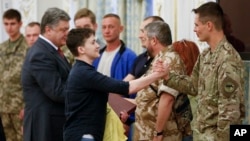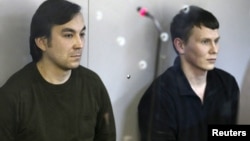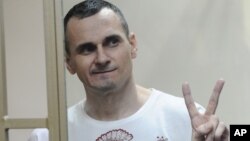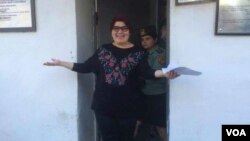Russia’s release of Ukrainian pilot Nadiya Savchenko, exchanged for two Russian servicemen, was welcomed by rights groups and supporters. They maintain her nearly two-year detention, trial, and 22-year sentence on charges of complicity in the deaths of two Russian journalists in east Ukraine was a political show.
"When Savchenko was convicted we spoke critically of that process,” said Denis Krivosheev, deputy director of the Europe and Central Asia regional office at Amnesty International. “It was highly politicized. It was clear that she did not receive a fair trial. So, that's one way to resolve it. And, in that sense, it's welcome."
The two Russian servicemen, Capt. Yevgeny Yerofeyev and Sgt. Alexander Alexandrov, captured in east Ukraine’s Donbas region, were believed to be working for Russian military intelligence. They were sentenced to 14 years on various terrorism-related charges for fighting Ukrainian forces. Russia claimed they had retired from the military and were volunteers.
The swap was "certainly a very unusual process, to put it mildly," Krivosheev said. "It's not common to swap people who stand accused of very serious crimes,” he added.
A prisoner swap had been floated for months but was delayed until sentencing, and by Russia’s demand that Savchenko, after being swapped, serve her time in a Ukrainian prison. On Wednesday, both sides revealed all three received presidential pardons.
Russia wants negotiations, not a breakthrough
“I regard the swap as Moscow's step in order to minimize its own negative image and show the West its readiness to discuss a broader compromise, taking into account the interests of Russia,” said Alexander Gushchin, head of the Center of Ukrainian Studies at the Russian State University for Humanities.
“I do not think, however, that this step will lead to an immediate breakthrough in negotiations on Donbas,” he said in an e-mailed response.
The prisoner swap came just a day after a phone call between Russian President Vladimir Putin, Ukrainian President Petro Poroshenko, and the leaders of France and Germany -- known as the Normandy format.
Russia has been pushing Kyiv to grant amnesty to the rebels Moscow supports in eastern Ukraine and agree to local elections on their terms. Kyiv and its Western backers have insisted on legitimate elections held under Ukrainian law.
Meanwhile, violence flared this week as seven Ukrainian troops were killed in a single day, the worst death toll in months. Russia has continued to deny it is giving military support to the rebels, despite overwhelming evidence.
Ukrainian hero and Russian intelligence
While Savchenko was greeted as a hero on her return to Ukraine - mobbed by the press and greeted by her political party leader, former prime minister Yulia Tymoshenko - the arrival of the two servicemen back in Moscow received only limited Russian state television coverage. The men were shown being greeted at a Moscow airport by their wives.
“As far as Ukraine, it is certainly some tactical success for it,” said Gushchin. “The only question is that various political forces will try to use Savchenko -- Tymoshenko, for one, and not only her, but other socially populist forces. As for our released [servicemen], I think they will be met without much publicity, but this is understandable due to the specifics of their work."
While Ukraine’s President Poroshenko has taken full responsibility for pardoning the Russian servicemen, Russia’s President Putin said it was the relatives of the slain Russian journalists who asked him to pardon Savchenko.
Just as Savchenko arrived back in Kyiv, Putin spoke on Russian television, in a choreographed message to the relatives, saying he hoped granting the pardon would reduce confrontation and losses in eastern Ukraine.
Putin credited Ukrainian politician Viktor Medvedchuk, a businessman who heads the pro-Russian political organization Ukrainian Choice, with helping to organize the prisoner exchange.
Victor Mironenko, head of the Center Of Ukrainian Studies at the Russian Academy of Sciences’ Institute of Europe, said the whole episode shows that Kremlin continues to hope it can spark a "social explosion" inside of Ukraine and is relying on "a new personal alliance, now with Medvedchuk,”
“None, in my opinion, will bring good results," said Mironenko. But the president [Putin] is convinced of the opposite. A de-escalation of the conflict should not be expected. We should expect attempts to wear down the enemy and, if not to win, at least force them to accept [Kremlin] conditions."
Ukrainian prisoners remain in Russia
Meanwhile, other Ukrainians remain behind bars in Russia, including high-profile figures like filmmaker Oleh Sentsov. He was sentenced to 20 years in prison last August, along with a co-defendant, on charges of leading a “terrorist group” and plotting attacks in Russia-annexed Crimea.
“We must not forget that others remain in detention, and ensuring that these rights are protected for them must play a central role in reaching any settlement,” said Michael Georg Link, director of the Organization for Security and Cooperation in Europe's (OSCE) Office for Democratic Institutions and Human Rights
Asked whether prisoner swaps could become a regular mechanism between Russia and Ukraine, Krivosheev said he hoped not. "If the basis for this is going to be prisoner swaps, then I think one side is running out of prisoners quite quickly,” he said. "But, then it's also the wrong basis for doing this. Justice has to be done in court and the court has to be fair. And, that's where the problem is. And, however many situations are resolved in this way it does not address that fundamental problem."
Radio Free Europe/Radio Liberty (RFE/RL) journalist Khadija Ismayilova was also free Wednesday, from a prison in Azerbaijan.
Baku’s Supreme Court reduced the investigative reporter’s September prison sentence from 7 1/2 years to a suspended 3 1/2 year term after removing some charges. Her conviction was widely condemned as retaliation for her investigative reports about alleged corruption connected to the family of President Ilham Aliyev.








